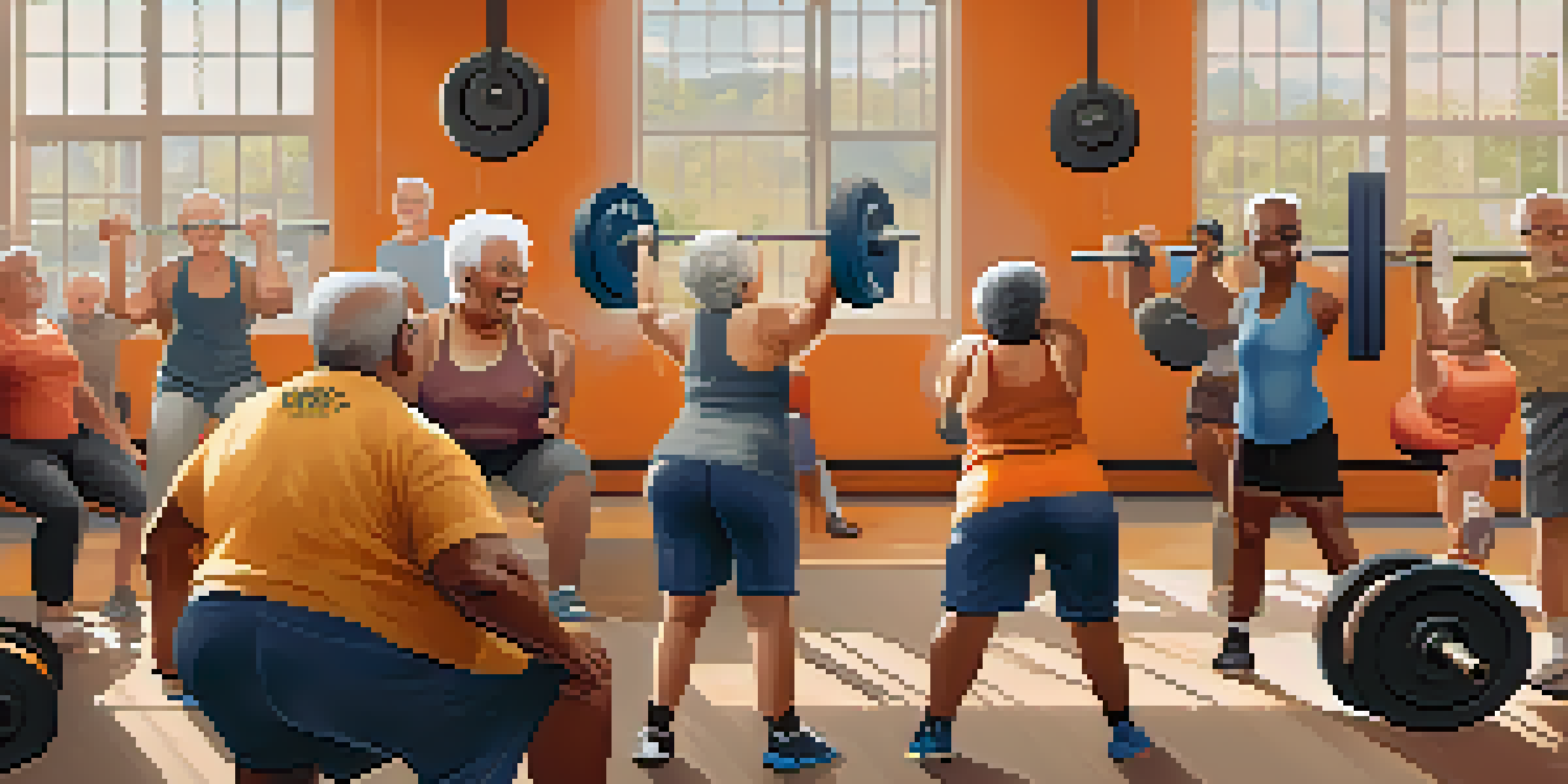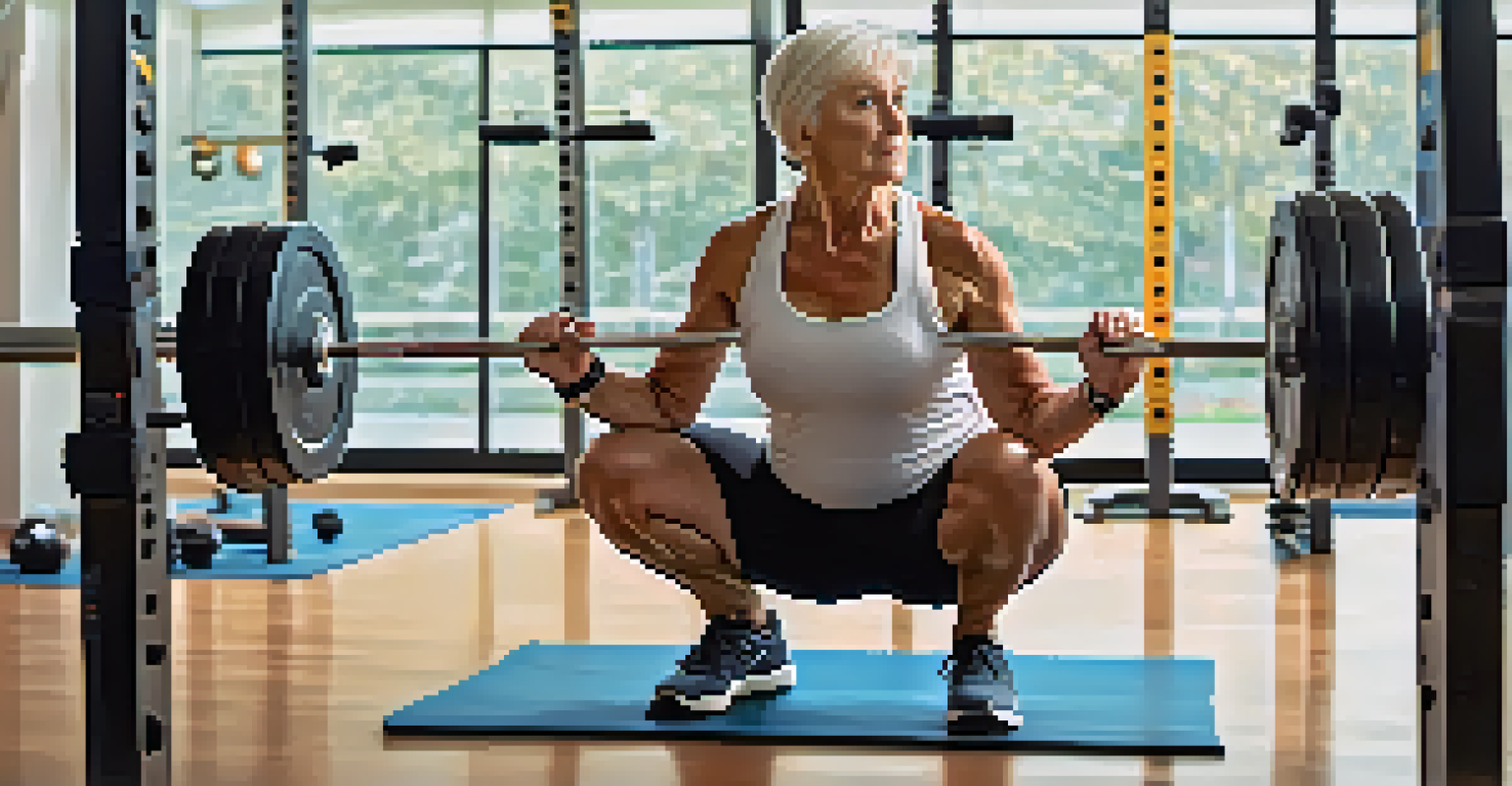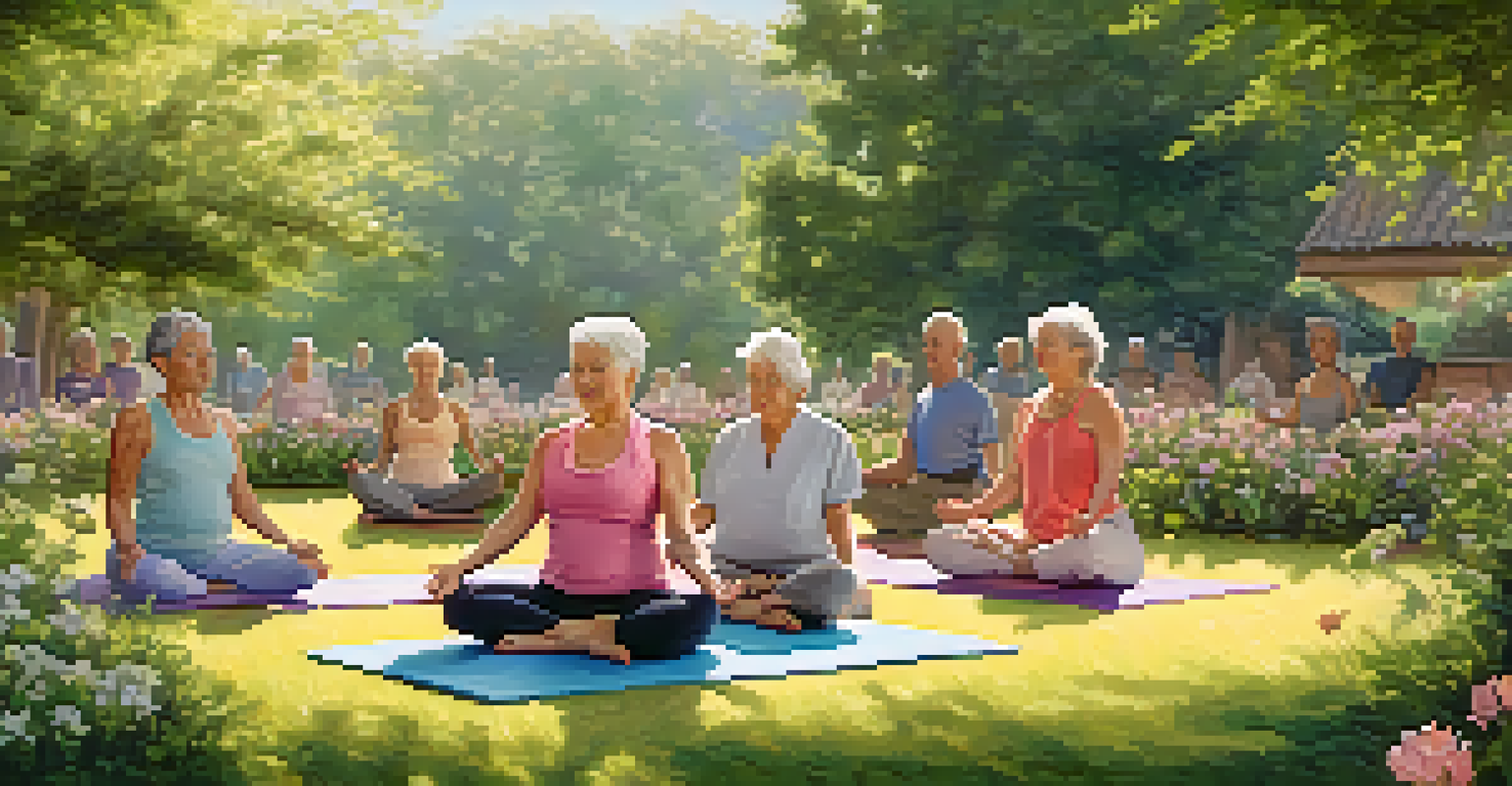Community and Connection: Powerlifting for Older Adults

Understanding Powerlifting and Its Benefits for Seniors
Powerlifting is a strength sport that focuses on three main lifts: the squat, bench press, and deadlift. This form of exercise is often perceived as something only for the young and fit, but it can be incredibly beneficial for older adults. Engaging in powerlifting can help improve muscle strength, balance, and overall mobility, which are vital for maintaining independence as we age.
Strength does not come from physical capacity. It comes from an indomitable will.
Beyond physical improvements, powerlifting can also enhance mental health. The discipline required for lifting weights can boost self-esteem and provide a sense of accomplishment, which is especially important for older adults seeking to maintain a positive outlook. Additionally, the focus on technique helps sharpen cognitive skills, keeping the mind active and engaged.
Moreover, powerlifting encourages a sense of community among participants. Many gyms and clubs offer classes specifically for older adults, creating an environment where they can share experiences and support one another. This camaraderie not only makes workouts more enjoyable but also fosters lasting friendships.
Building a Supportive Community Through Powerlifting
Joining a powerlifting class or community group can provide a strong support network for older adults. These groups often consist of individuals who share similar goals and challenges, creating an instant bond. This connection can be incredibly uplifting, helping participants feel less isolated and more motivated to achieve their fitness objectives.

In addition to emotional support, these communities often host group workouts and events, which can make training feel more like a social gathering than a chore. Participants cheer each other on during lifts, celebrate personal bests, and share tips for improvement, enhancing the overall experience. This collaborative spirit not only boosts individual performance but also strengthens the group's dynamic.
Powerlifting Benefits Seniors
Powerlifting improves strength, balance, and mental health in older adults, supporting their independence and well-being.
Furthermore, the friendships formed in these settings can lead to social activities outside of the gym, enriching participants' lives. Whether it's sharing a meal after a workout or planning outings, the connections formed through powerlifting can extend well beyond the gym walls, promoting a fulfilling social life.
Overcoming Barriers to Powerlifting for Older Adults
Many older adults may hesitate to try powerlifting due to misconceptions about their abilities or fears of injury. It's essential to address these concerns with education and encouragement. Understanding that powerlifting can be tailored to individual capabilities can help demystify the process and make it more accessible.
The greatest glory in living lies not in never falling, but in rising every time we fall.
Starting with lighter weights and focusing on proper form can significantly reduce the risk of injury while allowing seniors to build confidence. Many gyms offer introductory classes led by experienced trainers who specialize in working with older adults, ensuring a safe and supportive environment. This gradual approach can ease anxiety and help participants feel more comfortable in their newfound strength training journey.
Additionally, sharing success stories of older adults who have embraced powerlifting can empower others to take the leap. Hearing firsthand accounts of improved strength, confidence, and social connections can inspire those on the fence to give it a try. It's all about fostering an inclusive atmosphere where everyone feels welcome and capable.
The Importance of Proper Nutrition for Powerlifters
Nutrition plays a crucial role in the powerlifting journey, especially for older adults. A balanced diet rich in protein, healthy fats, and complex carbohydrates can enhance performance and recovery. Proper nutrition not only fuels workouts but also aids in muscle repair and growth, supporting overall health and vitality.
Older adults may have unique dietary needs, so it's essential to tailor nutrition plans accordingly. Consulting with a nutritionist can help create individualized meal plans that focus on nutrient-dense foods, ensuring that seniors get the vitamins and minerals necessary for optimal performance. This personalized approach can also address specific health concerns and dietary restrictions.
Community Boosts Motivation
Joining powerlifting groups fosters a supportive environment, enhancing motivation and creating lasting friendships among participants.
Hydration is another key factor that should not be overlooked. Drinking enough water throughout the day can help maintain energy levels and prevent fatigue during workouts. By prioritizing nutrition and hydration, older adults can maximize their powerlifting potential and enjoy the numerous benefits of this empowering sport.
Incorporating Flexibility and Recovery in Training
While powerlifting focuses on strength, incorporating flexibility and recovery into training routines is essential, especially for older adults. Stretching before and after workouts can improve range of motion and prevent injuries, making it a vital component of any training program. Additionally, dedicating time to recovery allows the body to heal and adapt to the stresses of lifting.
Gentle activities such as yoga or tai chi can complement powerlifting by enhancing flexibility and balance. These practices not only help improve physical performance but also promote relaxation and mental clarity. Integrating such activities into a weekly routine can create a well-rounded approach to fitness, ensuring that older adults maintain their strength while also caring for their bodies.
Listening to one's body and recognizing when to rest is crucial for longevity in powerlifting. Older adults should not shy away from taking recovery days or adjusting their training intensity. This balanced approach helps prevent burnout and keeps the passion for powerlifting alive, allowing seniors to enjoy the journey for years to come.
The Role of Coaches in Powerlifting for Seniors
Having a knowledgeable coach can profoundly impact an older adult's powerlifting experience. A coach who understands the unique needs and challenges faced by seniors can provide personalized guidance, helping participants progress safely and effectively. This relationship fosters trust, allowing individuals to feel confident in their training.
Coaches not only teach proper technique but also inspire motivation and accountability. They can create tailored workout plans that align with individual goals and ensure that participants remain engaged and challenged. The encouragement and support from a coach can make a significant difference in one's commitment to powerlifting.
Nutrition and Recovery Matter
Proper nutrition and recovery strategies are essential for older adults in powerlifting to maximize performance and maintain overall health.
Moreover, a good coach can help cultivate a positive training environment, making powerlifting feel less intimidating. They can facilitate a sense of community within the gym, encouraging older adults to connect with one another. This supportive atmosphere can enhance the overall powerlifting journey, making it an enjoyable and enriching experience.
Celebrating Achievements and Progress in Powerlifting
Celebrating milestones and achievements is crucial in the powerlifting journey, especially for older adults. Recognizing progress, whether it's lifting heavier weights or simply feeling stronger, boosts motivation and reinforces a sense of accomplishment. These celebrations can be as simple as sharing successes with friends or participating in local competitions.
Setting realistic, achievable goals is vital to maintaining engagement. Older adults can benefit from focusing on personal bests rather than comparing themselves to others. By tracking their progress and celebrating each step forward, individuals can build confidence and a positive mindset.

Additionally, sharing these achievements within the powerlifting community can further strengthen connections. Testimonials and success stories inspire others on their fitness journey, creating a culture of encouragement and support. Ultimately, celebrating progress helps foster a lifelong love for powerlifting and the sense of community that comes with it.